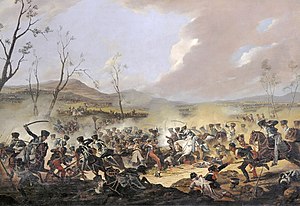Battle of Orthez
| Battle of Orthez | |||||||
|---|---|---|---|---|---|---|---|
| Part of the Peninsular War | |||||||
 The Final Charge of the British Cavalry at the Battle of Orthez by Denis Dighton |
|||||||
|
|||||||
| Belligerents | |||||||
|
|
|
||||||
| Commanders and leaders | |||||||
|
|
|
||||||
| Strength | |||||||
| 44,000, 54 guns | 36,000, 48 guns | ||||||
| Casualties and losses | |||||||
| 2,174 | 3,985, 6 guns | ||||||
The Battle of Orthez (27 February 1814) saw the Anglo-Portuguese Army under Field Marshal Arthur Wellesley, Marquess of Wellington attack a Imperial French army led by Marshal Nicolas Soult in southern France. The outnumbered French repelled several Allied assaults on their right flank, but their center and left flank were overcome and Soult was compelled to retreat. At first the withdrawal was conducted in good order, but it eventually ended in a scramble for safety and many French soldiers became prisoners. The engagement occurred near the end of the Peninsular War.
In mid-February, Wellington's army broke out of its small area of conquered territory near Bayonne. Moving east, the Allies drove the French back from several river lines. After a pause in the campaign, the western-most Allied corps surrounded and isolated Bayonne. Resuming their eastward drive, the remaining two Allied corps pushed Soult's army back to Orthez where the French marshal offered battle. In subsequent operations, Soult decided to abandon the large western port of Bordeaux and fall back east toward Toulouse. The next action was the Battle of Toulouse.
The Battle of the Nive ended on 13 December 1813 when Wellington's army repulsed the last of Soult's assaults. This ended the fighting for the year. Soult had found the Allied army divided by the Nive River but failed to inflict a damaging defeat. The French then pulled back within Bayonne's defenses and entered winter quarters. Heavy rains brought operations to a standstill for the next two months. After the Battle of Nivelle on 10 November 1813, Wellington's Spanish troops had gone out of control in seized French villages. Horrified at the idea of provoking a guerilla war by French civilians, the British commander imposed a vigorous discipline on his British and Portuguese soldiers and sent most of his Spanish troops home. Since his men were paid and fed by the British government, Pablo Morillo's Spanish division remained with the army. Wellington's policy paid dividends; his soldiers soon found that guarding the roads in his army's rear areas was no longer required.
...
Wikipedia
